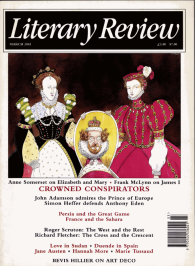Elisa Segrave
Dear Diary
Diary of an Ordinary Woman
By Margaret Forster
Chatto & Windus 406pp £16.99
MARGARET FORSTER IS the author of this fictional diary, a revelation which disappointed this reader; a compulsive diarist myself, I had thought it was genuine. Forster's invented diarist is a Miss Millicent King, who begins writing her diary in November 1914 and continues into the 1990s. It therefore spans almost a century and encompasses two world wars. Forster's fictional introduction tells how in 1999 she was approached by Millicent's nephew's wife Joanna. Joanna had read Forster's memoir Hidden Lives about her mother and grandmother and hoped therefore that she might 'make something' of the journals of this other 'ordinary' woman. Forster describes meeting first Joanna, then Millicent herself, in Millicent's West Country cottage. She decides to edit all her diaries. As Millicent - ninety-eight and five foot tall - hands Forster her first twenty-five volumes, she states: 'I never lied to them . . . never once lied.' I must say that I believed all this.
The defiant first entry sets the tone. Even at thirteen, Millicent knows her own mind:
26 November 1914
Father says if I want to keep a diary I must begin it on New Year's Day. He said no one starts a diary in November. But New Year's Day is five weeks away

Sign Up to our newsletter
Receive free articles, highlights from the archive, news, details of prizes, and much more.@Lit_Review
Follow Literary Review on Twitter
Twitter Feed
Margaret Atwood has become a cultural weathervane, blamed for predicting dystopia and celebrated for resisting it. Yet her ‘memoir of sorts’ reveals a more complicated, playful figure.
@sophieolive introduces us to a young Peggy.
Sophie Oliver - Ms Fixit’s Characteristics
Sophie Oliver: Ms Fixit’s Characteristics - Book of Lives: A Memoir of Sorts by Margaret Atwood
literaryreview.co.uk
For a writer so ubiquitous, George Orwell remains curiously elusive. His voice is lost, his image scarce; all that survives is the prose, and the interpretations built upon it.
@Dorianlynskey wonders what is to be done.
Dorian Lynskey - Doublethink & Doubt
Dorian Lynskey: Doublethink & Doubt - Orwell: 2+2=5 by Raoul Peck (dir); George Orwell: Life and Legacy by Robert Colls
literaryreview.co.uk
The court of Henry VIII is easy to envision thanks to Hans Holbein the Younger’s portraits: the bearded king, Anne of Cleves in red and gold, Thomas Cromwell demure in black.
Peter Marshall paints a picture of the artist himself.
Peter Marshall - Varnish & Virtue
Peter Marshall: Varnish & Virtue - Holbein: Renaissance Master by Elizabeth Goldring
literaryreview.co.uk